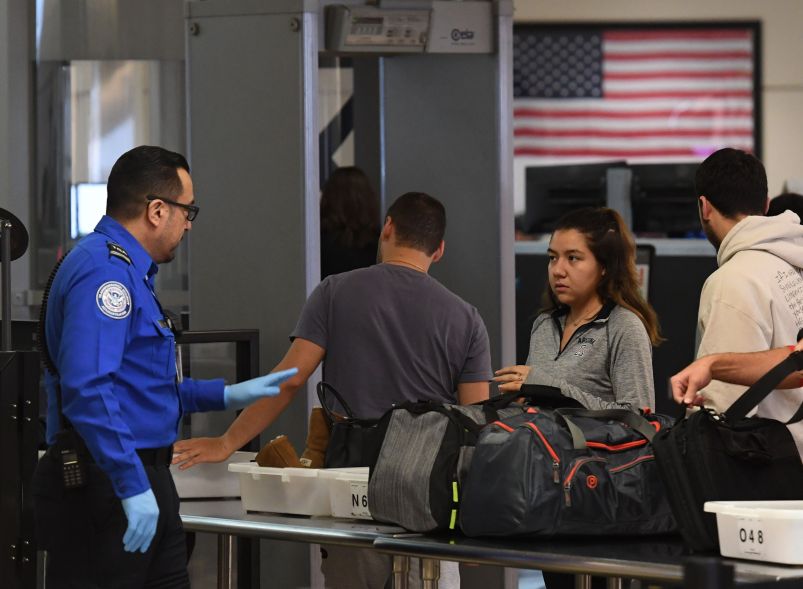DALLAS (AP) — The partial government shutdown is starting to affect air travel.
Over the weekend, some airports had long lines at checkpoints, apparently caused by a rising number of security officers calling in sick while they are not getting paid.
Safety inspectors aren’t even on the job. A Federal Aviation Administration spokesman said Monday that inspectors are being called back to work on a case-by-case basis, with a priority put on inspecting airline fleets.
So far, the impact of the shutdown — entering its 18th day on Tuesday — has been most visible for some government buildings and national parks being closed, and trash piling up on the National Mall in front of the Capitol. If the shutdown continues, food stamp recipients will go without aid.
By increasingly affecting air travel, however, the pain is being felt more widely.
Here are some common questions about the shutdown’s impact on airports and travel, along with the answers:
___
WHO IS SUPPOSED TO KEEP WORKING?
About 10,000 air traffic controllers who work for the Federal Aviation Administration and about 51,000 Transportation Security Administration officers have been told to keep reporting to work because they are deemed essential. Those workers at airport checkpoints, control towers and FAA radar stations aren’t being paid.
___
ARE THEY SHOWING UP?
TSA admits that more screeners are calling in sick at some airports, including Dallas-Fort Worth International. It gave few numbers but issued a statement Friday saying that more have been missing work since the Christmas and New Year’s holidays. The TSA said the effect was “minimal.”
Then over the weekend, travelers reported longer checkpoint lines at some airports, including LaGuardia in New York. On Monday, TSA tweeted that agents screened 2.22 million passengers nationwide on Sunday, which it called a “historically busy day due to holiday travel.” TSA said only about 220,000 travelers waited at least 15 minutes at checkpoints, while 0.2 percent — fewer than 5,000 — waited at least 30 minutes.
___
HOW WILL TSA RESPOND TO NO-SHOWS?
TSA spokesman Jim Gregory said officials are managing. “If we don’t have appropriations by midweek or so, (officers) will miss their first paycheck. That’s obviously where it becomes more difficult,” he said.
Gregory said the agency has a team of officers who can go to airports facing a shortage, a tactic developed in case natural disasters prevented screeners from getting to work.
___
WHAT ABOUT TRAFFIC CONTROLLERS?
About 1,900 air traffic controllers — nearly one in every five — are eligible to retire right now and it’s not clear how many of them will stick around. They won’t get paychecks later this week despite working over the holidays.
“I don’t know how long they’re going to stay on the job if they’re not getting a paycheck,” said Paul Rinaldi, president of the National Air Traffic Controllers Association.
There is an even larger group of recently hired trainees and apprentices and Rinaldi said the prospect of a long shutdown could lead some of them to take other jobs.
___
WILL A SHORTAGE OF CONTROLLERS LEAD TO FLIGHT DELAYS?
The largest pilots’ union wrote to President Donald Trump last week urging a quick end to the shutdown, which it said was threatening the safety of the nation’s airspace.
Rinaldi, the controllers’ leader, said safety is not being compromised, but that capacity to manage traffic could be reduced, leading to flight delays. Others see that as less likely.
“It would have to get pretty bad before the government said (to airlines), ‘Hey, start scaling back your plans for service,'” said Richard Aboulafia, an aviation analyst. “You could see that in a worst-case scenario.”
An early test of the air traffic system could come around the Feb. 3 Super Bowl in Atlanta, when an influx of corporate jets and private planes will further crowd the sky above the nation’s busiest airport. Planning for handling that traffic has been put on hold, Rinaldi said.
___
WHO HAS BEEN FURLOUGHED?
Workers who aren’t deemed essential. That ranges from technicians who maintain equipment used in airport towers to clerical staff. Federal aviation safety inspectors have also been furloughed.
___
SO WHO IS INSPECTING PLANES?
FAA spokesman Gregory Martin said the agency has been recalling inspectors for certain jobs including assignments at the airlines, as it did in previous government shutdowns.
“We’re going to continue to prioritize with the resources that we have,” Martin said. “Our focus is on the commercial air carriers and volumes of people they carry.”
Martin did not say how many inspectors are working or how the number of inspections being done compared with pre-shutdown levels.
Chuck Banks, one of those furloughed inspectors, said colleagues are being called in when an airline needs something, like a plane certified for flight. The routine, normal oversight of operations at airlines and repair shops is not being done, leaving companies to regulate themselves, he said.
“Do you like the fox watching the hen house?” he said. “Every day the government stays shut down, it gets less safe to fly.”
___
WHAT OTHER GOVERNMENT SERVICES ARE AFFECTED?
The National Transportation Safety Board is delaying accident investigations and hearings. While there have not been any fatal airline crashes, the board has delayed other investigations, including an examination of a Florida highway accident that killed five children on their way to Walt Disney World.
NTSB representatives did not answer phone calls or reply to emails Monday. A recorded message for the public affairs office said nobody would respond until the shutdown ends.
Some people who applied for Global Entry, a program that lets travelers get expedited clearance into the U.S., have had interviews canceled. Gary Leff, who writes about travel on his View from the Wing blog, said that some airports are still processing applications.
The program is run by U.S. Customs and Border Protection. Spokespeople at the agency did not respond for comment.



